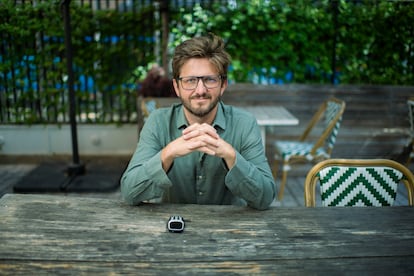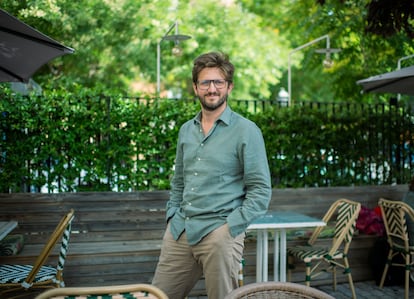Diego Hidalgo: ‘Banning the sale of phones to teenagers would empower parents’
He is a sociologist and a magician, and spends his life warning about the risks of a screen addiction that ‘makes us unhappy.’ At home, he leads by example: his mobile phone is an old Nokia without internet access


Almost two decades ago, while he was at Cambridge, Diego Hidalgo, 40, discovered that Facebook, instead of connecting us, separated us. As a teenager he had already witnessed how the tyranny of email stole hours of quality time with his family. It is a childhood memory that marked him forever. Today, fighting against the tech giants has become his life’s mission. It is a quixotic cause in which his mind as a sociologist contrasts with the irrational nature of his other profession, that of a magician, with which he surprises audiences in the lectures he gives around the world.
Question. Do magic and technology have anything in common?
Answer. Yes, in many ways. Magicians steal the public’s attention just like digital technology does. In addition, we make the spectator think that they are free to make decisions when in reality it is the magician who determines these. I’ll show you. [He searches his backpack, takes out a deck of poker cards, tells the journalist to choose a card and performs a trick.]
Q. In your new book Taking Back Control, you say that Google makes decisions for us all the time.
A. We think we are choosing from an infinite menu, but in reality it is guiding us towards different options. The massive exploitation of data allows technology companies to build predictive models and to know our cognitive weaknesses. This makes us more easily manipulated when it comes to selling us products, services or ideologies…
Q. Do we live in a kind of Truman Show in which we are constantly under surveillance?
A. The difference is that now we are all Truman.
Q. For example, you argue that the use of mobile phones should be banned in bars, as was the case with tobacco…
A. Yes, well, that’s more of a provocation [he laughs], but I think there needs to be collective action at the individual and political level to get ahead of regulations. There are certainly enough arguments to ban the sale of mobile phones until the age of majority, as happens with gambling halls or alcohol.
Q. What is the difference between a marijuana addiction and a screen addiction?
A. The second is socially accepted. It is shared by almost 100% of society and that is why it is much more difficult for us to realize that it is not normal to accept the harm it causes.
Q. Many parents talk about the social pressure they feel if they are the only ones in their school who don’t give their children a cellphone…
A. That’s why banning their sale to teenagers would empower them. The way they use mobile phones is like having 14-year-olds driving cars without a license at 160 km/h (100 mph), with the danger that this entails for themselves and for others.
Q. A few months ago, the United Kingdom considered banning them for children under 16. Isn’t that a difficult political decision for a government to make?
A. Yes, but in the end this is like climate change. A challenge for democracies in the long term when politics lives in the short term. The regulatory framework for technology should be similar to that of the pharmaceutical and agri-food industries.
The way minors use mobile phones is like having 14-year-olds driving cars without a license”
Q. You dedicate the book to your children, who are from Generation Z, with this phrase: “So that you may continue choosing happiness and freedom over immediacy and efficiency.” Are we slaves to technology?
A. Of course, because they are designed to anesthetize us. I believe in the right to make mistakes and to have criteria other than those of the algorithms. We are increasingly asking Google broader questions: what gift to buy, how to be a better parent, what to do with my children on vacation... And that limits our freedom.
Q. And it infantilizes us…
A. Yes, it simplifies us as a species. As we delegate powers to devices or apps, we are less able to exercise them ourselves. For example, if you can no longer get anywhere without looking at your GPS, you are accepting an ecosystem in which you are increasingly dependent.
Q. Are you worried about your children’s future?
A. I am concerned about the world they will inhabit because the relationship between screens and high rates of anxiety and depression in adolescents is more than proven. I have three kids, but the psychological impact that social media is having on girls is much more worrying than on boys. In the United States, self-harm among girls has increased sixfold in the last 12 years.
Q. Do you limit screen use at home?
A. Absolutely. I don't completely remove them from technology, but I do want to give them a healthy, guided and controlled relationship so that they learn to use it without it using them.

Q. In today’s climate of technological omnipresence, your cause sounds quixotic. Do you encounter many doubters?
A. When I published my first book on the subject in 2021, I thought I was going to receive a lot more criticism, but I think that as a society we are increasingly aware that we are facing a very worrying phenomenon.
Q. What do you think of those who call you a technophobe?
A. I identify more with the term technocritic because I believe that technology can be used to do interesting things. I myself have been a digital entrepreneur and founded Amovens [the first car-sharing platform in Spain]. There is a very clear scientific basis for the risks of the technological revolution and we should not enter into dogmatism as is also the case with climate change.
Q. Your mobile phone is an old Nokia with no internet access. Do you think you are happier than those reading this interview on their smartphone?
A. Happiness depends on many factors, but it may be because delegating our lives to machines impoverishes our life experience. If we continue to hand over our lives to algorithms that dictate our decisions, we will lose freedom and stop interacting deeply with others. And these are two key elements for happiness.
Sign up for our weekly newsletter to get more English-language news coverage from EL PAÍS USA Edition
Tu suscripción se está usando en otro dispositivo
¿Quieres añadir otro usuario a tu suscripción?
Si continúas leyendo en este dispositivo, no se podrá leer en el otro.
FlechaTu suscripción se está usando en otro dispositivo y solo puedes acceder a EL PAÍS desde un dispositivo a la vez.
Si quieres compartir tu cuenta, cambia tu suscripción a la modalidad Premium, así podrás añadir otro usuario. Cada uno accederá con su propia cuenta de email, lo que os permitirá personalizar vuestra experiencia en EL PAÍS.
¿Tienes una suscripción de empresa? Accede aquí para contratar más cuentas.
En el caso de no saber quién está usando tu cuenta, te recomendamos cambiar tu contraseña aquí.
Si decides continuar compartiendo tu cuenta, este mensaje se mostrará en tu dispositivo y en el de la otra persona que está usando tu cuenta de forma indefinida, afectando a tu experiencia de lectura. Puedes consultar aquí los términos y condiciones de la suscripción digital.








































